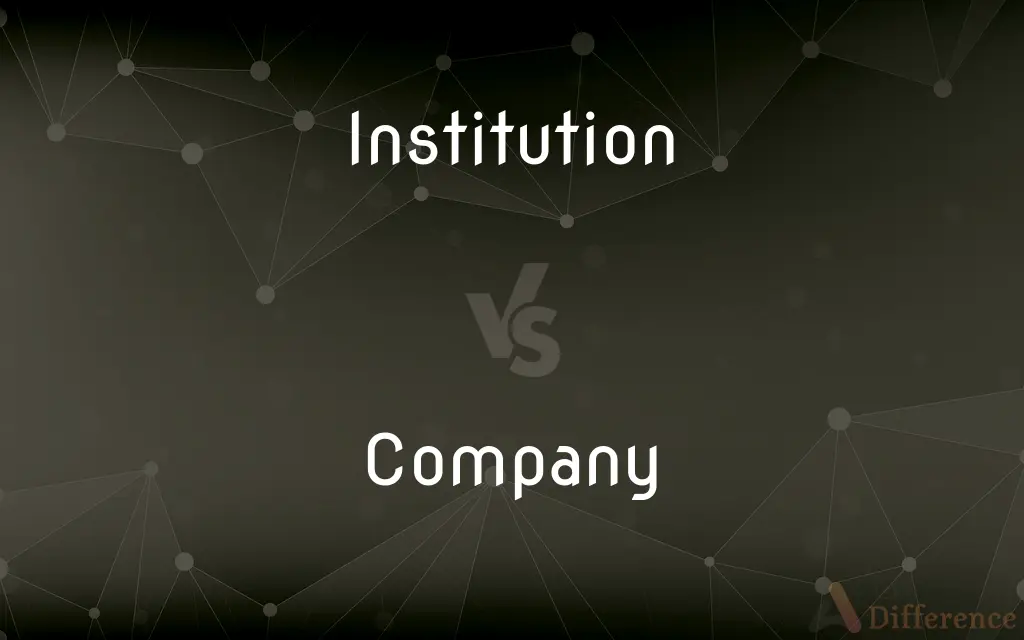Institution vs. Company — What's the Difference?
Edited by Tayyaba Rehman — By Maham Liaqat — Updated on March 6, 2024
An institution is a significant entity in society, often public, focused on educational, financial, or social objectives, while a company is a business entity formed to sell goods or services for profit.

Difference Between Institution and Company
Table of Contents
ADVERTISEMENT
Key Differences
Institutions encompass a wide range of organizations, including educational facilities, banks, and governmental bodies, aiming to serve a public interest or societal need. They are often characterized by their enduring presence and role in societal structure. On the other hand, companies are specifically created for commercial activities, focusing on generating profit through the sale of products or services. While institutions may operate in a nonprofit or for-profit manner, their primary objective is not always financial gain, focusing instead on societal impact.
Institutions are typically governed by a set of rules and regulations that dictate their operation, aiming to ensure stability and reliability in their services. These can include universities, charities, and cultural entities. Conversely, companies are governed by business laws and operate within markets, competing for customers and market share. Their governance structures, such as boards of directors, focus on strategic business decisions and profitability.
The funding sources for institutions vary widely, including government funding, donations, and grants, reflecting their broad societal role. Meanwhile, companies rely on revenue generated from their business activities, investments, and sometimes public offerings in stock markets. This fundamental difference highlights the distinct economic roles and sustainability models of each.
In terms of public perception, institutions are often seen as cornerstones of society that contribute to its overall structure and function, such as schools and hospitals. Companies, however, are viewed through the lens of their economic activity, brand, and contribution to employment and innovation within an economy.
The impact of institutions and companies extends beyond their immediate sphere of operation. Institutions play a crucial role in shaping cultural, educational, and social norms, while companies drive economic growth, technological advancement, and job creation. Both are essential to societal development, but their core missions and approaches to achieving their goals differ significantly.
ADVERTISEMENT
Comparison Chart
Purpose
Serve societal, educational, or financial needs
Generate profit through sales of goods/services
Governance
Governed by regulations, often public or non-profit
Operated under business laws, focused on profit
Funding
Government funding, donations, grants
Business revenue, investments, stock market
Impact
Cultural, educational, social norms
Economic growth, innovation, employment
Public Perception
Seen as societal cornerstones
Viewed through economic activity and brand
Compare with Definitions
Institution
A foundational societal entity with a public service mission.
The Smithsonian Institution educates and preserves heritage.
Company
A business entity focused on selling products or services for profit.
The company launched a new line of eco-friendly products.
Institution
Governed by a set of principles or regulations.
Financial institutions are regulated to ensure economic stability.
Company
Operates in a competitive market to gain customers.
The software company invests heavily in innovation to stay ahead.
Institution
Funded through a variety of non-commercial means.
The museum operates on grants and public donations.
Company
Governed by a board of directors focusing on profitability.
The company's board approved the expansion into new markets.
Institution
Impacts societal norms and knowledge.
Educational institutions play a key role in shaping future generations.
Company
Relies on sales revenue, investments for funding.
The startup company raised funds through venture capital.
Institution
Often non-profit, serving educational or cultural purposes.
The public library is an essential institution in our community.
Company
Drives economic growth and employment.
The tech company has become a major employer in the region.
Institution
A custom, practice, relationship, or behavioral pattern of importance in the life of a community or society
The institutions of marriage and the family.
Company
A commercial business
A company director
A shipping company
The Ford Motor Company
Institution
An established organization or foundation, especially one dedicated to education, public service, or culture.
Company
A number of individuals gathered together
The Mayor addressed the assembled company
Institution
A building or complex of buildings housing people who need special services, such as orphans or people with mental disabilities.
Company
Associate with; keep company with
These men which have companied with us all this time
Institution
The act or process of instituting; as: (a) Establishment; foundation; enactment; as, the institution of a school.
The institution of God's law is described as being established by solemn injunction.
Company
One's companions or associates
Moved in fast company.
Is known by the company she keeps.
Institution
That which instituted or established
The nature of our people,Our city's institutions.
Company
The state of friendly companionship; fellowship
Was grateful for her company.
Friends who finally parted company.
Institution
That which institutes or instructs; a textbook; a system of elements or rules; an institute.
There is another manuscript, of above three hundred years old, . . . being an institution of physic.
Company
A business enterprise; a firm.
Institution
An organization founded and united for a specific purpose
Company
(business) Any business, whether incorporated or not, that manufactures or sells products (also known as goods), or provides services as a commercial venture.
Institution
An establishment consisting of a building or complex of buildings where an organization for the promotion of some cause is situated
Company
A company, abbreviated as co., is a legal entity representing an association of people, whether natural, legal or a mixture of both, with a specific objective. Company members share a common purpose and unite to achieve specific, declared goals.
Institution
Institutions, according to Samuel P. Huntington, are "stable, valued, recurring patterns of behavior". Institutions can refer to mechanisms which govern the behavior of a set of individuals within a given community, and are identified with a social purpose, transcending individuals and intentions by mediating the rules that govern living behavior.
Institution
A building or complex of buildings housing such an organization.
Institution
Instruction; education.
Common Curiosities
What distinguishes an institution from a company?
The primary distinction is their core purpose: institutions aim to serve societal needs, while companies focus on profit-making.
Can a company become an institution?
While companies primarily aim for profit, those with longstanding impact and significance in society can be colloquially referred to as institutions.
What role do governments play in institutions and companies?
Governments regulate both but may directly fund or operate institutions for public benefit, while typically engaging with companies through regulation and economic policies.
Are all institutions non-profit?
Many institutions operate on a non-profit basis, but not all. Some, like private universities, may operate for-profit while serving educational goals.
What is the impact of institutions on education?
Educational institutions are fundamental in providing knowledge, fostering innovation, and shaping skilled societies.
Are there hybrid forms between institutions and companies?
Yes, social enterprises and benefit corporations blend profit goals with societal missions, acting as hybrids.
Can institutions engage in commercial activities?
Some institutions may engage in commercial activities related to their mission, but their primary aim is not profit.
Do companies have social responsibilities?
Companies increasingly recognize their social responsibilities, engaging in sustainable and ethical practices for social good.
Can a company's brand become as influential as an institution?
Yes, strong company brands can significantly influence cultural and social norms, much like institutions.
How does governance differ between institutions and companies?
Institutions are often governed by regulations and societal missions, while companies focus on business strategies and shareholder value.
How do institutions and companies contribute to society?
Institutions contribute through societal, educational, or cultural development, while companies drive economic growth and innovation.
How do institutions and companies affect employment?
Institutions often provide stable, mission-driven jobs, while companies create a wide range of employment opportunities in various sectors.
How do funding sources differ between institutions and companies?
Institutions may rely on a mix of government, donations, and grants, whereas companies primarily use business revenues and investment.
Share Your Discovery

Previous Comparison
Attraction vs. Destination
Next Comparison
Manageable vs. FeasibleAuthor Spotlight
Written by
Maham LiaqatEdited by
Tayyaba RehmanTayyaba Rehman is a distinguished writer, currently serving as a primary contributor to askdifference.com. As a researcher in semantics and etymology, Tayyaba's passion for the complexity of languages and their distinctions has found a perfect home on the platform. Tayyaba delves into the intricacies of language, distinguishing between commonly confused words and phrases, thereby providing clarity for readers worldwide.
















































